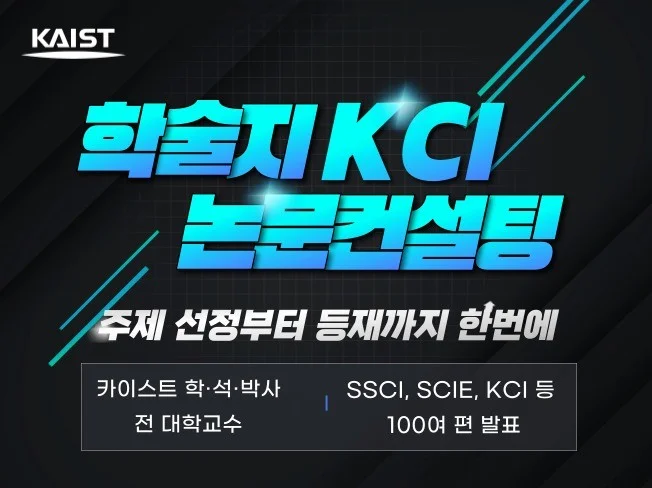
최근 받은 리뷰
전체보기서비스 설명
※ 각종 논문, 과제, 자기소개서 등의 문서를 '대신 작성'해주는 불법 서비스와 무관함을 알려 드립니다.
※ 서비스 설명
1) 제공할 서비스 설명 (서비스 판매의도, 목적, 효과)
- 본 논문 컨설팅 서비스는 연구자분들이 원하는 연구를 더욱 효과적으로 할 수 있게끔 도움을 드리는데 제공 의도가 있습니다. 본 서비스를 통하여 학술지 논문, 일반 정보 문서 들의 작성 능력을 함양하실 수 있습니다. 더불어, 연구 역량을 키우실 수 있습니다.
- 학위 논문도 함께 서비스를 제공합니다.
2) 서비스 금액 산정기준 및 제공방식 안내 (견적 산정 기준, 시간, 범위, 방식)
- 유사 서비스 제공 업체 대비 더 저렴한 요금으로 차별화를 하였습니다. 1) 시간 당 컨설팅의 경우 회당 30분 컨설팅 (고객 당 1회 한정), 2) 단계별 집중 컨설팅은 이미 논문 진도가 어느 정도 진행 되신 분들의 게재를 돕는 컨설팅, 3) 종합 컨설팅은 주제 선정부터 논문 승인까지의 전체 컨설팅입니다. 서비스 범위는 논문 작성에 필요한 지식 전수, 집필 요령, 문헌 검색, 참고문헌, 원고 첨삭, 심사 이후 답변 대응 등입니다. 비대면 미팅으로 컨설팅을 수행하고, 논문 작성에 필요한 과제를 정하여 진행하는 식입니다.
※ 전문가 소개
1) 전문가 자기소개
저는 논문을 읽고 쓰는 것을 즐기는 연구자입니다.
2) 전문가 경력/이력사항
카이스트 학, 석, 박사
우수 논문상 수상(카이스트 논문 컨퍼런스, 한국정보시스템학회)
전(前) 한국경영정보학회 이사, 전 한국정보시스템학회 이사, 전 한국인터넷전자상거래 이사, 전 국제 e-비즈니스 학회 이사, 전 국제지식서비스 학회 이사
전(前) 다수 대학교 시간강사 및 외래 교수 활동 (세종대, 국민대, 한성대, 수원대 등)
현(現) 국제 저널 'AI' 특집호 편집장
https://www.mdpi.com/journal/ai/special_issues/1E867U567B
현(現) 다수 국제 학술지 심사위원 활동 중(International Journal of Human-Computer Interaction, Information Development, Education and Information Technologies, International Review of Research in Open and Distributed Learning 등)
3) 서비스 제공 주요 분야 및 차별화 포인트
3.A. 서비스 제공 주요 분야는 상경계열, 사회과학계열, 기타 행위 연구(설문조사, 통계분석)에 해당하는 논문의 컨설팅입니다. 전/현직 경험들을 바탕으로 ‘연구자에게 필요한 역량’과 ‘논문 작성에 요구되는 핵심적인 내용’을 친절하게 전달해 드립니다.
STANDARD(시간 당 컨설팅, 첫 만남 컨설팅): 논문 컨설팅에 대한 전반적인 문의, 저에 대한 검증을 위한 컨설팅입니다. 30분 간의 컨설팅을 받아 보시고, 지속적으로 진행 하실지를 결정해 주시면 됩니다.
DELUXE(단계별 집중 컨설팅): 주제선정, 문헌탐색, 모형설계, 설문조사, 통계분석, 원고요령, 인용 정리, 참고문헌 정리 등 각 단계별로 심층적인 컨설팅을 수행하는 서비스입니다.
PREMIUM(종합 컨설팅): 주제선정부터 최종 논문 원고, 투고, 심사, 답변, 승인까지의 전 과정을 진행하는 서비스 입니다.
3.B. 차별화 포인트
3.B.1. 심사위원의 시각에서 중요한 포인트를 짚어드립니다. 전직에서 수행했던 여러 심사 경험을 바탕으로 학술지 등재 희망자에게 필요한 역량과 '논문에서 중요한 열쇠'를 알려 드립니다.
3.B.2. 더 적은 시간에 더 효과적으로 연구하는 노하우를 알려 드립니다. 연구를 하다보면 진행이 정체되는 경우가 자주 생기는데 이러한 현상을 방지하는 방법을 알려 드립니다.
3.B.3. 학술지 논문 작성에 필요한 전반적인 지식을 알려 드립니다. 학술지 별 성향, 논문 집필 전략, 게재 승인을 받기 위한 요령을 전해 드립니다.
4) 기존 작업물 / 포트폴리오 필수 기재
KCI, SCOPUS, SSCI/SCEI 급 논문 100여 편 출판
발표된 주요 학술지: 대한경영학회지, 무역연구, 인터넷전자상거래연구, 인터넷정보학회논문지, 전자상거래학회지, 정보시스템연구, 중소기업연구, 지식경영연구, 한국IT서비스학회지, 한국데이터정보과학회지, 한국산학기술학회논문지, 한국전자거래학회지, 한국정보기술학회논문지, 한국지역정보화학회지, 한국콘텐츠학회 논문지, Asia Pacific Viewpoint, Asia-Pacific Education J, BMC Public Health, Frontiers in Psychology, Heliyon, Humanities and Social Sciences Communications, Information Development, Information Technology and Tourism, International Journal Human Computer Interaction, Journal Business and Industrial Marketing, Journal Information Science, Journal the Knowledge Economy, Mobile Information Systems, PLOS ONE, Scientific Reports, Sustainability, Technology Analysis & Strategic Management 등
5) 논문 목록
A. 국내 학술지 (KCI)
[1] Analyzing Consumer Adoption in Subscription Services: Perceived Benefits, Sacrifices, and Innovativeness, Journal of Korean Institute of Information Technology, Vol. 22, No. 8, pp. 165-176, 2024.
[2] 정보원 특성과 소구방식이 바이럴 영상 광고에 미치는 영향, 인터넷전자상거래연구, 19권, 1호, 353-368, 2019.
[3] ERP 정보 시스템의 전환 의도에 영향을 미치는 요인, 한국정보기술학회논문지, 13권, 10호, 129-136, 2015.
[4] AHP를 활용한 개인 클라우드 스토리지 서비스 선택 요인에 관한 연구, 한국IT서비스학회지, 14권, 3호, 197-215, 2015.
[5] 모바일 소셜 네트워크 게임의 특성이 지속적 이용의도에 미치는 영향, 인터넷전자상거래연구, 15권, 4호, 159-178, 2015.
[6] 스마트폰 애플리케이션의 정보 시스템 성공 요인, 중복성, 인지된 용량이 제거 행위에 미치는 영, e-비즈니스연구, 16권, 4호, 67-82, 2015.
[7] e-교육 정보시스템의 성공 모형에 관한 연구, 한국정보기술학회논문지, 13권, 6호, 121-127, 2015.
[8] 모바일 애플리케이션의 충성도에 영향을 미치는 요인, e-비즈니스연구, 16권, 3호, 205-220, 2015.
[9] 모바일 애플리케이션의 플로우에 영향을 미치는 요인에 관한 연구, 한국IT서비스학회지, 14권, 2호, 111-128, 2015.
[10] 대학 정보 시스템의 지속적 사용의도에 영향을 미치는 요인, 한국정보기술학회논문지, 13권, 5호, 131-138, 2015.
[11] D&M 모형 관점에서의 스마트 기기 애플리케이션 성공요인, 한국정보기술학회논문지, 13권, 3호, 129-135, 2015.
[12] 정보전달 네트워크의 변화가 주식시장의 가격 변동성에미치는 영향, 인터넷전자상거래연구, 15권, 1호, 195-213, 2015.
[13] 버즈량이 영화 흥행에 미치는 영향, 인터넷전자상거래연구, 19권, 1호, 211-221, 2019.
[14] 대학 종합 시스템의 전환 의도에 관한 실증 연구, e-비즈니스연구, 16권, 1호, 83-97, 2015.
[15] SNS 사용자의 후 채택 행위에 관한 이해, Telecommunications Review, 24권, 1호, 121-136, 2014.
[16] 공익광고 효과에 미치는 상호작용 영향:광고주 인지도, 광고 소구 및 수용자 관여도와 인지욕구 중심으로, 한국IT서비스학회지, 12권, 4호, 235-253, 2013.
[17] 그린 비즈니스/IT도입시 인식에 따른 실행계획 차이에 대한 탐색적 연구:한국 제조기업을 중심으로, 한국IT서비스학회지, 12권, 4호, 289-305, 2013.
[18] 전자정부의 체계적 수출에 관한 연구, 무역연구, 9권, 6호, 427-448, 2013.
[19] 중소 자본재 기업 개방형 혁신에서의 정부출연(연)의 역할 탐색 : 일반기계산업을 중심으로, 중소기업연구, 35권, 3호, 1-24, 2013.
[20] ERP 시스템의 지속적 사용의도에 관한 연구: 조선해양기업 A사를 중심으로, Entrue Journal of Information Technology, 12권, 2호, 127-137, 2013.
[21] 사이버 이주: 온라인 서비스 전환에 관한 실증 연구, Telecommunications Review, 23권, 4호, 472-486, 2013.
[22] 면대면 취업 컨설팅에 대한 추천 의도의 선행요인 - 온라인 취업 컨설팅 서비스 효과 제고를 위한 선행연구 -, e-비즈니스연구, 14권, 3호, 115-133, 2013.
[23] IS 성공 모형과 TAM 관점에서의 ERP 성공요인: 조선해양산업을 중심으로, 인터넷전자상거래연구, 13권, 2호, 85-103, 2013.
[24] 스마트 출결 시스템의 성공 요인, 인터넷전자상거래연구, 18권, 3호, 297-308, 2018.
[25] 인터넷 전자상거래 환경에서의 구전효과의 선행 요인에 관한 연구, 한국IT서비스학회지, 12권, 2호, 231-242, 2013.
[26] 온라인 거래 환경에서의 상품 만족에 관한 이해, 한국콘텐츠학회 논문지, 13권, 5호, 436-442, 2013.
[27] 소셜 네트워크의 태그와 시간 정보를 반영한 추천 알고리즘, 인터넷정보학회논문지, 14권, 2호, 15-24, 2013.
[28] 정보기술수용 모형을 활용한 소셜 네트워크 서비스 사용자들의 전환 의도 분석, 한국정보기술학회논문지, 11권, 4호, 1-9, 2013.
[29] 조선해양 산업에서의 ERP 구축 사례 연구, 한국IT서비스학회지, 12권, 1호, 189-199, 2013.
[30] 온라인 쇼핑몰의 재이용 의도에 영향을 미치는 요인:쇼핑 즐거움과 집중도를 중심으로, 한국IT서비스학회지, 12권, 1호, 201-213, 2013.
B. 국제학술지 (SCIE/SSCI/A&HCI)
*** 주요 출판 논문 ***
* JCR 상위 1%: From concerns to benefits: a comprehensive study of ChatGPT usage in education. International Journal of Educational Technology in Higher Education, 21(1), 35. https://doi.org/10.1186/s41239-024-00471-4, 2024. (IF 8.6 JCR 상위 1%)
* JCR 상위 3%: A comprehensive analysis of presence, seamlessness, and player responses in metaverse gaming. Computers in Human Behavior, 159, 108345. https://doi.org/https://doi.org/10.1016/j.chb.2024.108345, 2024. (IF 9.0 JCR 상위 3%)
* JCR 상위 4%: Understanding AI tool engagement: A study of ChatGPT usage and word-of-mouth among university students and office workers. Telematics and Informatics (SSCI), 85, 102067. https://doi.org/https://doi.org/10.1016/j.tele.2023.102067, 2023. (IF 7.6 JCR 상위 4%)
* JCR 상위 6%: Enhancing digital literacy in later life: the role of perseverance and consistency of interest. sInteractive Learning Environments, 1-16. https://doi.org/10.1080/10494820.2024.2414355, 2024. (IF 3.7 JCR 상위 6%)
* JCR 상위 8%: Tourism in the digital frontier: a study on user continuance intention in the metaverse. Information Technology & Tourism (SSCI). https://doi.org/10.1007/s40558-023-00257-w, 2023. (IF 6.3 JCR 상위 8%)
*** SCI급 논문 전체 출판 목록 ***
[1] Enhancing digital literacy in later life: the role of perseverance and consistency of interest. sInteractive Learning Environments, 1-16. https://doi.org/10.1080/10494820.2024.2414355, 2024.
[2] Adoption and Continuance in the Metaverse. Electronics, 13(19), 3917. https://www.mdpi.com/2079-9292/13/19/3917 2024.
[3] Differential Effects of Collaborative Partners on Financial and Growth Outcomes in Ventures in South Korea. Asia Pacific Business Review. https://doi.org/10.1080/13602381.2024.2402456, 2024.
[4] Exploring the adoption of social robots: Influences of promotion focus, anthropomorphism, and monetary sacrifice. Social Behavior and Personality: an international journal, 52(9), e13459. https://doi.org/https://doi.org/10.2224/sbp.13459, 2024.
[5] Wellness and Wanderlust: How Social Wellness Impacts Travel Motivation. International Journal of Tourism Research, 26(5), e2745. https://doi.org/https://doi.org/10.1002/jtr.2745, 2024.
[6] Investigating viewer engagement in esports through motivation and attitudes toward metaverse and NFTs. Scientific Reports, 14(1), 19934. https://doi.org/10.1038/s41598-024-70847-z, 2024.
[7] Utilizing Topic Modeling to Identify Sustainability Trends in the Golf Industry. Sustainability, 16(15), 6507. https://www.mdpi.com/2071-1050/16/15/6507 2024.
[8] Why Do Online Crowdsourcing Platform (OCP) Visitors Recommend Idea Competition to Others? Sage Open, 14(3), 21582440241266063. https://doi.org/10.1177/21582440241266063, 2024.
[9] Understanding digital engagement: factors influencing awareness and satisfaction of digital transformation. Discover Computing, 27(1), 23. https://doi.org/10.1007/s10791-024-09455-4, 2024.
[10] Omnichannel word-of-mouth genesis: the confluence of online-offline experiences, social influence and skepticism. Asia Pacific Journal of Marketing and Logistics, ahead-of-print(ahead-of-print). https://doi.org/10.1108/APJML-03-2024-0259, 2024.
[11] A Multi-Faceted Examination of Social Robots Adoption: Influences of Perceived Enjoyment, Social Attraction, and Pet Experience. IEEE Access, 1-1. https://doi.org/10.1109/ACCESS.2024.3434544, 2024.
[12] Impact of COVID-19 on mobile application usage intensity. International journal of Mobile Communications, 24(1), 64-81. https://doi.org/10.1504/IJMC.2024.139308, 2024.
[13] Virtual resonance: analyzing IPA usage intensity under COVID-19's isolating canopy. Scientific Reports, 14(1), 15048. https://doi.org/10.1038/s41598-024-64809-8, 2024.
[14] Exploring loyalty drivers for smartphone and mobile carriers. Humanities and Social Sciences Communications, 11(1), 859. https://doi.org/10.1057/s41599-024-03371-0, 2024.
[15] A comprehensive analysis of presence, seamlessness, and player responses in metaverse gaming. Computers in Human Behavior, 159, 108345. https://doi.org/https://doi.org/10.1016/j.chb.2024.108345, 2024.
[16] From concerns to benefits: a comprehensive study of ChatGPT usage in education. International Journal of Educational Technology in Higher Education, 21(1), 35. https://doi.org/10.1186/s41239-024-00471-4, 2024.
[17] Subscription intentions for ChatGPT plus: a look at user satisfaction and self-efficacy. Marketing Intelligence & Planning, ahead-of-print(ahead-of-print). https://doi.org/10.1108/MIP-08-2023-0411, 2024.
[18] Impacts of noise-induced hearing loss on sleep, health, and workplace: Multi-group analysis. Heliyon, 10(9). https://doi.org/10.1016/j.heliyon.2024.e30861, 2024.
[19] Investigating the Factors Influencing User Loyalty, Purchase Intention, and Word-of-mouth in Virtual Reality. PRESENCE: Virtual and Augmented Reality, 1-59. https://doi.org/10.1162/pres_a_00423, 2024.
[20] Metaverse gaming: analyzing the impact of self-expression, achievement, social interaction, violence, and difficulty. Behaviour & Information Technology, 1-15. https://doi.org/10.1080/0144929X.2024.2341059, 2024.
[21] Effects of ChatGPT’s AI capabilities and human-like traits on spreading information in work environments. Scientific Reports, 14(1), 7806. https://doi.org/10.1038/s41598-024-57977-0, 2024.
[22] Navigating Online Learning Satisfaction in the Age of COVID-19: An Examination of Key Influencing Factors. Journal of Internet Technology, 25(2), 185-194. https://doi.org/10.53106/160792642024032502002, 2024.
[23] Navigating the Omnichannel Landscape: Unraveling the Antecedents of Customer Loyalty. Sage Open, 14(1), 21582440241233091. https://doi.org/10.1177/21582440241233091, 2024.
[24] From storefront to screen: an in-depth analysis of the dynamics of online for offline retailing. Humanities and Social Sciences Communications, 11(1), 209. https://doi.org/10.1057/s41599-024-02723-0, 2024.
[25] Uncovering the Reasons behind Willingness to Pay for ChatGPT-4 Premium. International Journal of Human–Computer Interaction (SCIE/SSCI), 1-16. https://doi.org/10.1080/10447318.2024.2307692, 2024.
[26] The sound of safety: exploring the determinants of prevention intention in noisy industrial workplaces. BMC Public Health (SCIE), 24(1), 90. https://doi.org/10.1186/s12889-023-17618-z, 2024.
[27] Sequential customer experiences leading to continuance intention in the mobile telecom industry: from contract to call center. Telecommunication Systems (SCIE). https://doi.org/10.1007/s11235-023-01090-6, 2024.
[28] Analyzing ChatGPT adoption drivers with the TOEK framework. Scientific Reports (SCIE), 13(1), 22606. https://doi.org/10.1038/s41598-023-49710-0, 2023.
[29] From Classroom to Screen: Analyzing the Mechanisms Shaping E-Learning Benefits Amidst COVID-19. Journal of the Knowledge Economy (SSCI). https://doi.org/10.1007/s13132-023-01614-0, 2023.
[30] Determinants of Word-of-Mouth in the Virtual Reality Market: A Focus on Aesthetic Attributes and Perceived Value. International Journal of Human–Computer Interaction (SCIE/SSCI), 1-17. https://doi.org/10.1080/10447318.2023.2285644, 2023.
[31] Exploring the dynamics of mobile app addiction: the interplay of communication, affective factors, flow, perceived enjoyment, and habit. BMC Psychology (SSCI), 11(1), 404. https://doi.org/10.1186/s40359-023-01440-8, 2023.
[32] Factors influencing continuance intention of participants in crowdsourcing. Humanities and Social Sciences Communications (SSCI/A&HCI), 10(1), 824. https://doi.org/10.1057/s41599-023-02335-0, 2023.
[33] AI in the Workplace: Examining the Effects of ChatGPT on Information Support and Knowledge Acquisition. International Journal of Human–Computer Interaction (SCIE/SSCI), 1-16. https://doi.org/10.1080/10447318.2023.2278283, 2023.
[34] A study of user switching intention for ERP systems based on push-pull-mooring model: Focusing on the important role of information quality for users. PLOS ONE (SCIE), 18(11), e0289483. https://doi.org/10.1371/journal.pone.0289483, 2023.
[35] Understanding AI tool engagement: A study of ChatGPT usage and word-of-mouth among university students and office workers. Telematics and Informatics (SSCI), 85, 102067. https://doi.org/https://doi.org/10.1016/j.tele.2023.102067, 2023.
[36] Understanding continuance intention of enterprise resource planning (ERP): TOE, TAM, and IS success model. Heliyon (SCIE), 9(10). https://doi.org/10.1016/j.heliyon.2023.e21019, 2023.
[37] Predictors of social networking service addiction. Scientific Reports (SCIE), 13(1), 16705. https://doi.org/10.1038/s41598-023-43796-2, 2023.
[38] Decoding the ChatGPT mystery: A comprehensive exploration of factors driving AI language model adoption. Information Development (SSCI), 02666669231202764. https://doi.org/10.1177/02666669231202764, 2023.
[39] Improving Collaborative Filtering Recommendations with Tag and Time Integration in Virtual Online Communities. Applied Sciences (SCIE), 13(18), 10528. https://www.mdpi.com/2076-3417/13/18/10528 2023.
[40] Affordance, usefulness, enjoyment, and aesthetics in sustaining virtual reality engagement. Scientific Reports (SCIE), 13(1), 15097. https://doi.org/10.1038/s41598-023-42113-1, 2023.
[41] Customization, loneliness, and optimism: drivers of intelligent personal assistant continuance intention during COVID-19. Humanities and Social Sciences Communications (SSCI/A&HCI), 10(1), 529. https://doi.org/10.1057/s41599-023-02021-1, 2023.
[42] Social isolation in COVID-19: a comparative study between Korea and Vietnam. BMC Public Health (SCIE), 23(1), 1556. https://doi.org/10.1186/s12889-023-16491-0, 2023.
[43] Mechanisms for successful management of enterprise resource planning from user information processing and system quality perspective. Scientific Reports (SCIE), 13(1), 12678. https://doi.org/10.1038/s41598-023-39787-y, 2023.
[44] Tourism in the digital frontier: a study on user continuance intention in the metaverse. Information Technology & Tourism (SSCI). https://doi.org/10.1007/s40558-023-00257-w, 2023.
[45] Impacts of social isolation and risk perception on social networking intensity among university students during covid-19. PLOS ONE (SCIE), 18(4), e0283997. https://doi.org/10.1371/journal.pone.0283997, 2023.
[46] What Drives Recommendation Intention and Loyalty of Online for Offline (O4O) Consumers? Sustainability (SCIE/SSCI), 15(6), 4775. https://www.mdpi.com/2071-1050/15/6/4775 2023.
[47] Hi Bixby: Determinants of goal-congruent usage and goal-congruent outcome in the artificial intelligence personal assistant context. Journal of Information Science (SCIE/SSCI), 01655515231161554. https://doi.org/10.1177/01655515231161554, 2023.
[48] Understanding the Continuance Intention of Omnichannel: Combining TAM and TPB. Sustainability, 15(4), 3039. https://doi.org/https://doi.org/10.3390/su15043039, 2023.
[49] Examining the key factors influencing loyalty and satisfaction toward the smart factory. Journal of Business & Industrial Marketing (SSCI), 38(3), 484-493. https://doi.org/10.1108/JBIM-02-2021-0124, 2023.
[50] Understanding the key antecedents of users’ continuance intention in the context of smart factory. Technology Analysis & Strategic Management (SSCI), 35(2), 153-166. 2023.
[51] Antecedents of Continuance Intention of Social Networking Services (SNS): Utilitarian, Hedonic, and Social Contexts. Mobile Information Systems (SCIE), 2022, 7904124. https://doi.org/10.1155/2022/7904124, 2022.
[52] Determinants of continuance intention towards e-learning during COVID-19: an extended expectation-confirmation model. Asia Pacific Journal of Education (SSCI), 1-21. https://doi.org/10.1080/02188791.2022.2140645, 2022.
[53] Continuance intention to use artificial intelligence personal assistant: type, gender, and use experience. Heliyon (SCIE), 8(9), e10662. https://doi.org/https://doi.org/10.1016/j.heliyon.2022.e10662, 2022.
[54] What drives university students to practice social distancing? Evidence from South Korea and Vietnam. Asia Pacific Viewpoint (SSCI), 64(1), 47-59. https://doi.org/https://doi.org/10.1111/apv.12351, 2023.
[55] Effects of Psychological Discomfort on Social Networking Site (SNS) Usage Intensity During COVID-19. Frontiers in Psychology (SSCI), 13, 939726. https://doi.org/10.3389/fpsyg.2022.939726, 2022.
[56] Success factors of untact lecture system in COVID-19: TAM, benefits, and privacy concerns. Technology Analysis & Strategic Management (SSCI), 1-13. https://doi.org/10.1080/09537325.2022.2093709, 2022.
[57] Key Factors Influencing Loyalty and Satisfaction Toward ERP: Mediating Role of Flow. Journal of the Knowledge Economy (SSCI). https://doi.org/10.1007/s13132-022-00981-4, 2022.
[58] Determinants of postadoption behaviors of mobile communications applications: a dual-model perspective. International Journal of Human-Computer Interaction (SCIE/SSCI), 30(7), 547-559. https://doi.org/https://doi.org/10.1080/10447318.2014.888501, 2014.
서비스 제공 절차
1. 저에게 쪽지로 컨설팅 받고자 하는 내용(전공, 연구 주제, 방법론, 현재 진행 상황)을 문의해 주세요.
2. 쪽지로 상담이 끝나면 크몽을 통해 원하는 옵션을 결제해 주세요.
3. 미팅 전에 현재까지 작업된 내용물을 저에게 보내주세요.
4. 미팅은 화상 채팅으로 진행이 됩니다. 미팅 전에 제가 링크를 보내 드려요.
5. 미팅이 끝나면 논문 진행에 필요한 파일, 관련 자료 들을 보내 드립니다. 이후, 구매확정과 구매후기를 남겨 주시면 됩니다! : )
작업 언어
한국어
영어
준비 단계
주제 선정
프로포절
논문 초고
논문 통계
본심/결론
심사방어
논리적교정
논문 종류
석사논문
박사논문
학술지
논문 분야
상경
사회과학
의학/보건
인문학
예술/체육
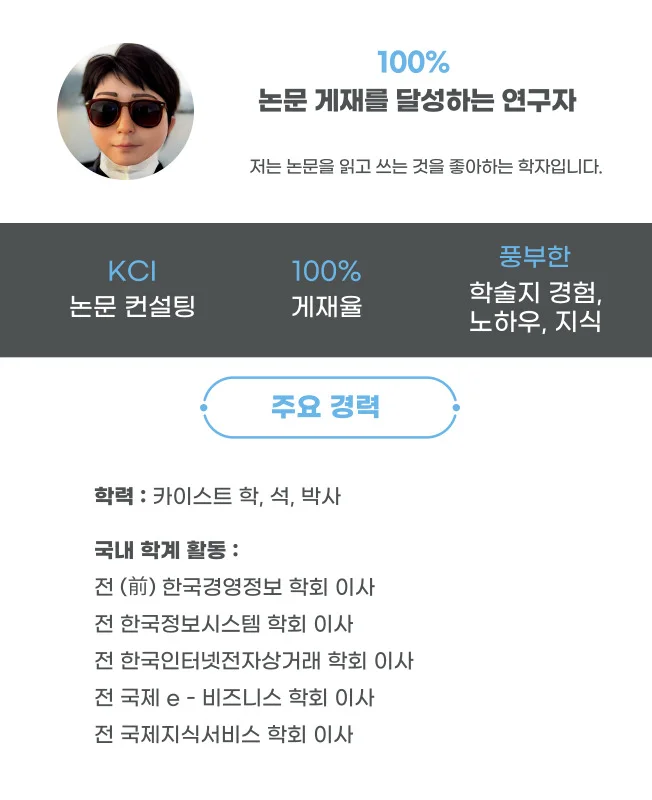
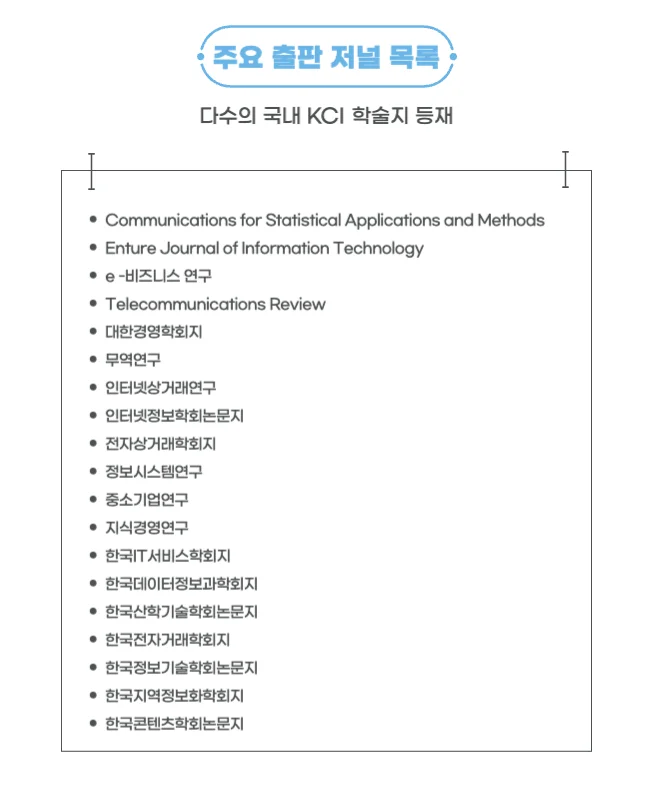
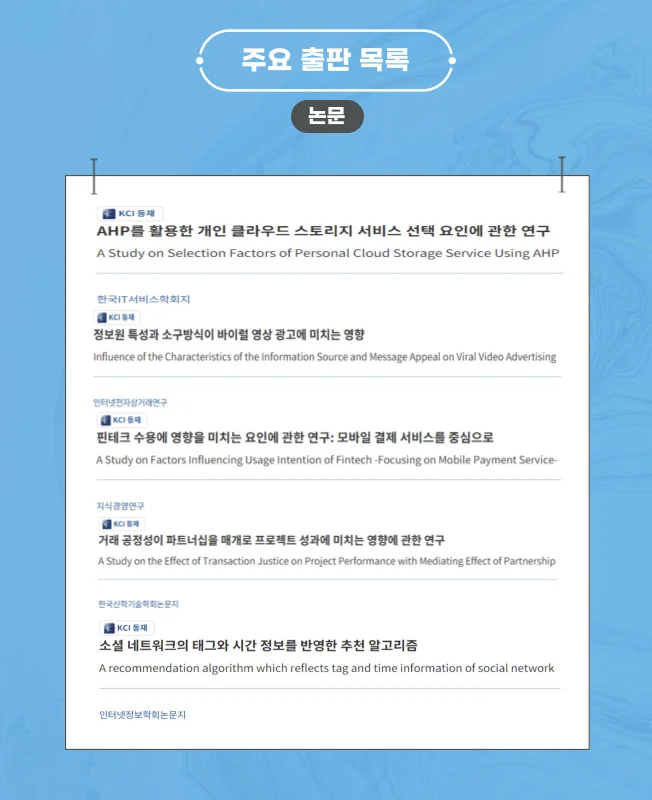
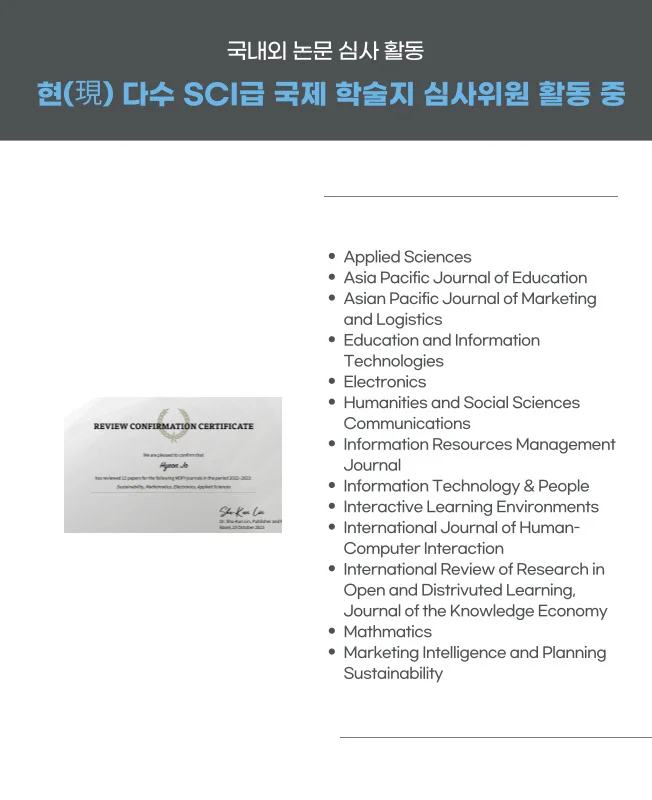
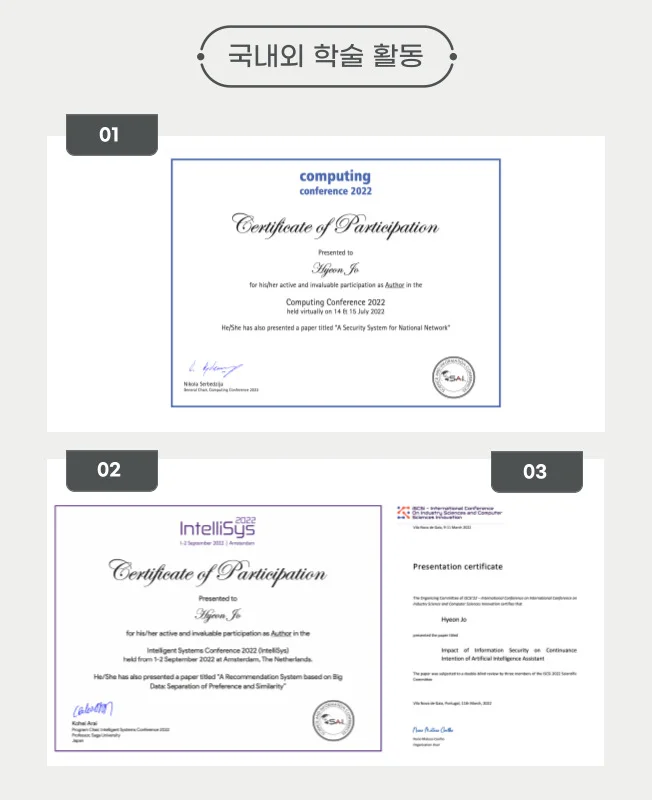
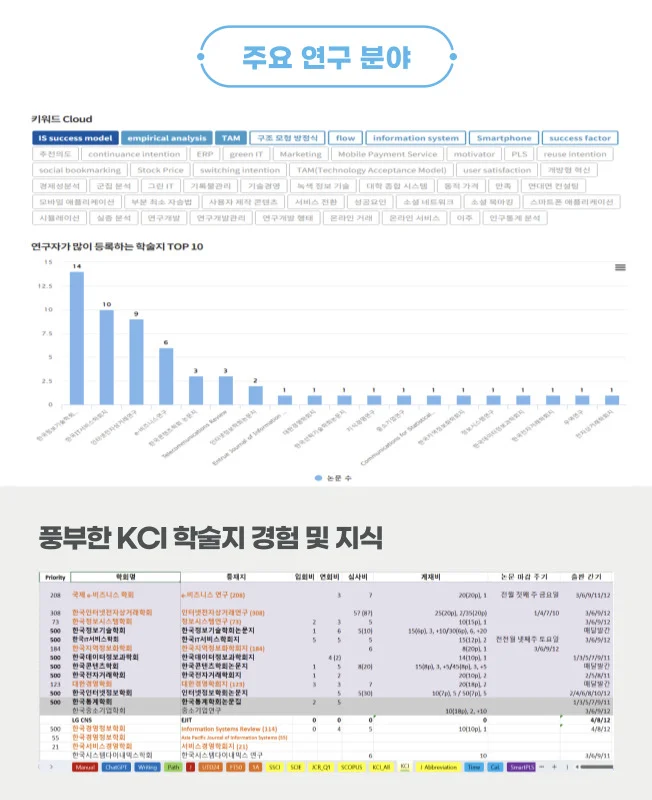
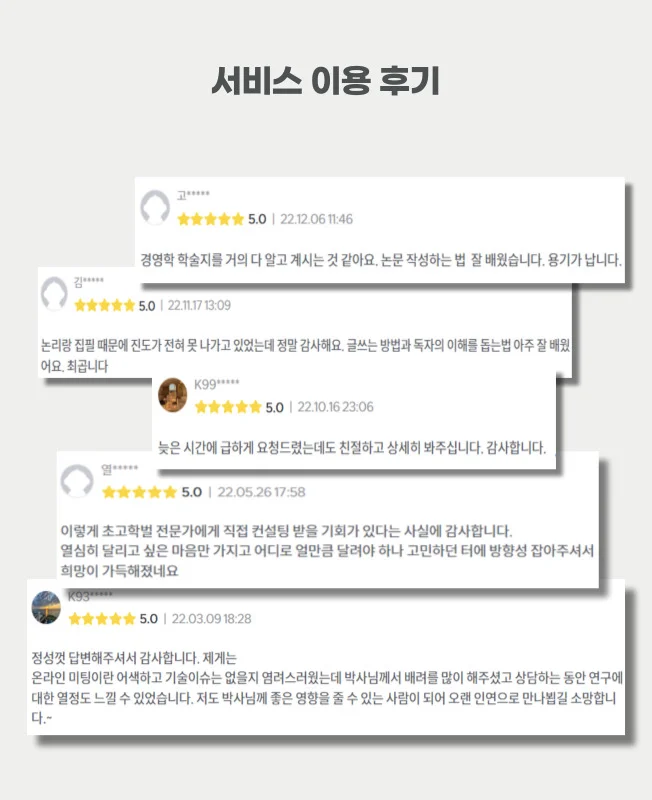
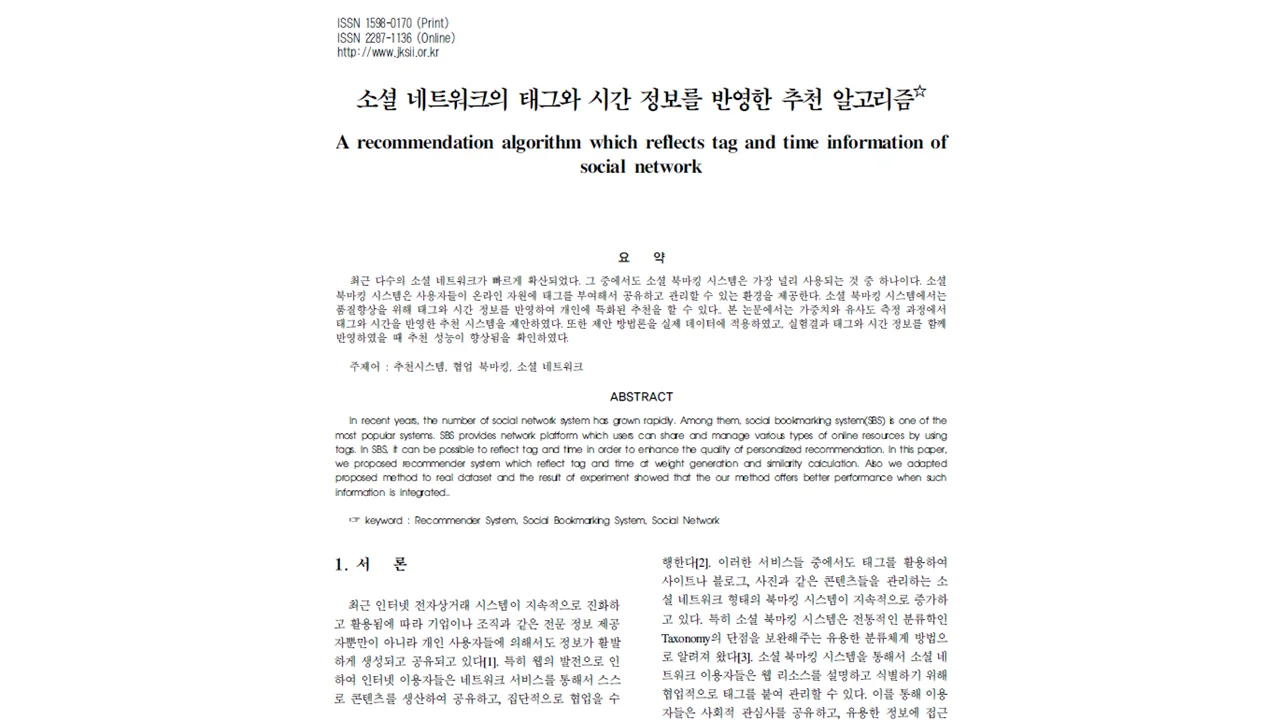
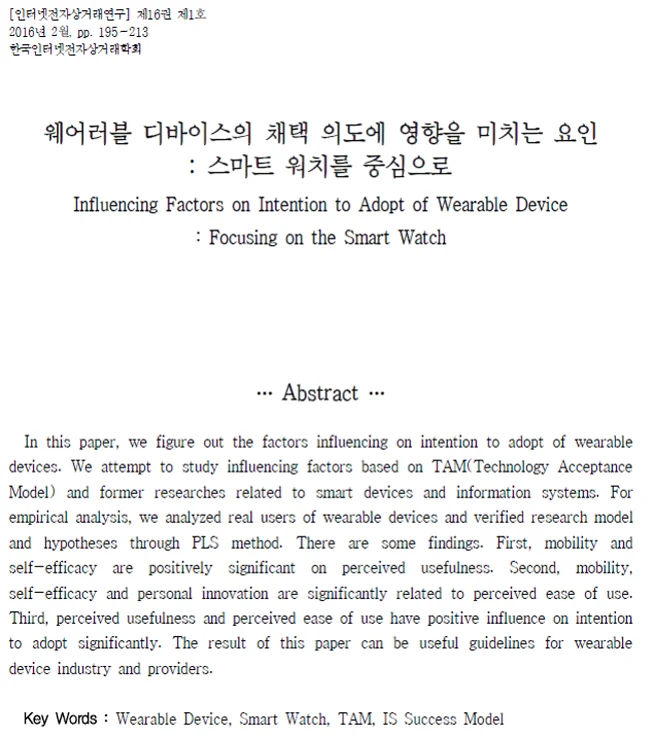
가격 정보
STANDARD
70,000원
DELUXE
1,500,000원
PREMIUM
2,800,000원
패키지 설명
시간 당 컨설팅(30분)
- 논문 준비, 연구 관심사, 논문 작성 방법 등에 대해서 30분간 문답식 컨설팅
단계별 집중 컨설팅
- 주제 선정, 문헌 탐색, 모형 설계 등 단계별, 맞춤형 컨설팅 (3주 진행)
종합 컨설팅(KCI 학술지논문)
- 논문 등재가 승인될 때까지의 종합 컨설팅, 통계, 교정 포함 - 학술지 별 원고 전체 함께 완성
작업일
3일
21일
35일
수정 횟수
0회
1회
제한없음
전문가 정보
수정 및 재진행
논문 집필 및 데이터 분석 과정에 있어 치명적인 문제가 있는 경우에는 모든 과정을 수정해 드립니다!
취소 및 환불 규정
가. 기본 환불 규정 1. 작업 진행 전일 경우 전문가와 의뢰인 상호 협의하에 청약 철회 및 환불이 가능합니다. 2. 작업 진행 후 의뢰인의 단순 변심으로 인한 환불 요청은 제한될 수 있습니다. 3. 작업이 완료된 이후 또는 자료, 문서 등 서비스가 제공된 이후에는 환불이 불가합니다. (소비자보호법 17조 2항의 5조. 용역 또는 「문화산업진흥 기본법」 제2조제5호의 디지털콘텐츠의 제공이 개시된 경우에 해당) 나. 전문가 책임 사유 1. 전문가의 귀책사유로 당초 약정했던 서비스 미이행 혹은 보편적인 관점에서 심각하게 잘못 이행한 경우 결제 금액 전체 환불이 가능합니다. 다. 의뢰인 책임 사유 1. 서비스 진행 도중 의뢰인의 귀책사유로 인해 환불을 요청할 경우, 사용 금액을 아래와 같이 계산 후 총 금액의 10%를 공제하여 환불합니다. - 총 작업 진행량의 1/3 경과 전 : 이미 납부한 요금의 2/3해당액 - 총 작업 진행량의 1/2 경과 전 : 이미 납부한 요금의 1/2해당액 - 총 작업 진행량의 1/2 경과 후 : 반환하지 않음 2. 작업 진행 중 의뢰인의 폭언, 욕설 등이 있을 경우 작업은 종료될 수 있으며 환불이 제한될 수 있습니다.
상품정보고시
| 서비스 제공자 | SuperPaperAuthor | 취소/환불 조건 | 취소 및 환불 규정 참조 |
| 인증/허가사항 | 상품 상세 참조 | 취소/환불 방법 | 취소 및 환불 규정 참조 |
| 이용조건 | 상품 상세 참조 | 소비자상담전화 | 결제 전 상담 제공 |
리뷰
5.0
(26)
